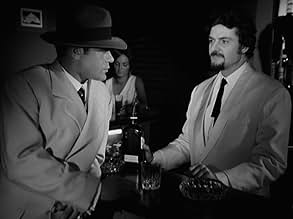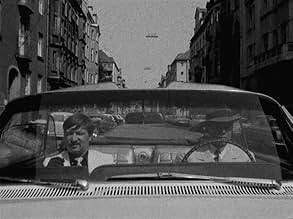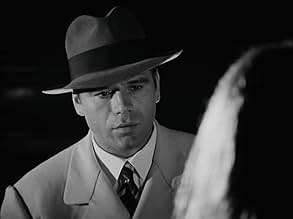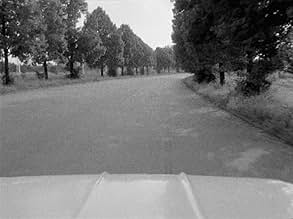CALIFICACIÓN DE IMDb
6.5/10
2 k
TU CALIFICACIÓN
Ricky es un asesino a sueldo. Tras servir en la guerra de Vietnam, vuelve a su Múnich natal para eliminar a varios individuos corruptos.Ricky es un asesino a sueldo. Tras servir en la guerra de Vietnam, vuelve a su Múnich natal para eliminar a varios individuos corruptos.Ricky es un asesino a sueldo. Tras servir en la guerra de Vietnam, vuelve a su Múnich natal para eliminar a varios individuos corruptos.
- Dirección
- Guionista
- Elenco
Marquard Bohm
- Privatdetektiv
- (sin créditos)
Rainer Werner Fassbinder
- Franz Walsch
- (sin créditos)
Peer Raben
- Hotel Receptionist
- (sin créditos)
- Dirección
- Guionista
- Todo el elenco y el equipo
- Producción, taquilla y más en IMDbPro
Opiniones destacadas
Not one of Fassbinder's best, but certainly worth a look for those interested in the man's work. In mood and style, it's reminiscent of Godard's Alphaville, and my reactions to both films are similar: I am intrigued, but a bit bored. And I don't think either succeed in the end. The American Soldier concerns a haughty German-American soldier, fresh from Vietnam, who struts around killing people for reasons which are kept mostly obscure (he's some kind of gangster or hitman). The police are after him, though the police seem just as wicked. I didn't care much about what was going on no compelling reason was ever given for me to care. However, many elements of the film impressed me. Fassbinder's idiosyncratic sense of pace and mood pervades. The performances are pretty good. Fassbinder himself appears in a small role and, as usual, he delivers a remarkable performance. He has to be the best actor/director of all time. Peer Raben never seems to write a lot of music for Fassbinder's films. Instead, he just writes one theme that is used several times throughout the given picture. They are always exceptional, and his theme (and also theme song, which is the same tune with lyrics added) is excellent here. And then there's this ending. Fassbinder has a talent for unique and notable endings, and the end of this film is one of the weirdest and most remarkable I've ever seen. 7/10.
The European pseudo-noirs of the 60s and 70s reaped the benefits of being able to skip a number of steps in the writing process simply by adopting styles and themes from previous films. What was left was to add one's own spin to an existing story. Fassbinder was a genius at taking a style and making it his own, not in a superficially Tarantino-ish way, but in a way that was at once equally unique and dependent, retaining the benefits of a style and pushing it even further into his own territory.
In this sense, this film is an early experiment: a war veteran turned contract killer stoically carrying out his duties, but in a post-war German environment and with homoerotic undertones galore. But it's remarkably coherent and compelling considering how little the plot gives away explicitly. Indeed, this would become one of his trademarks.
4 out of 5 - An excellent film
In this sense, this film is an early experiment: a war veteran turned contract killer stoically carrying out his duties, but in a post-war German environment and with homoerotic undertones galore. But it's remarkably coherent and compelling considering how little the plot gives away explicitly. Indeed, this would become one of his trademarks.
4 out of 5 - An excellent film
"Der Amerikanische Soldat" (1970) is R.W. Fassbinder's least understood movie. Most people think - and this conviction can be found also in textbooks about Fassbinders as well as in reference works of film - that he just wanted to create a German Film Noir as a kind of reverence for his love for the respective American movies of the 50ies. Nothing can be less adequate! The American Soldier, asked by a prostitute, if he is a real Yank, answers: "First, there was Germany ... . Once there was a little boy ... He flew over the Pond ... . Scheisse!". I think the main problem with the story is that Fassbinder purposely does not portray The American Soldier as an American who has been called by the German police to abolish a bunch of criminals. Richard Murphy alias Richard Von Rezzori is a German. When Franz Walsch alias Fassbinder asks him during their car trip: "And how was it in Vietnam?" - Richard's astonishing answer is: "Loud". In this little dialog, there is all you need to understand this outstanding movie. Another crucial scene is when Richard visits his paternal house. As one sees, not only he, but also his mother and his brother are drinkers. When he rings the bell, he tries to kiss his mother, but she disgustedly turns away her head. His brother smashes a wine-glass in his hand until he bleeds. After Richard has left, he starts to cry and says: "Mama, I still love him!". So, who is the American Soldier? A German noble-man who became an American citizen in order to be legitimated to clean-up what had destroyed his soul in Germany? Vietnam as a legitimation to get rid of the burdens of his soul? But about such things one does not speak, and so it was just "loud" down there. But is there not an additional point of criticism in Fassbinder's movie? Fact is: It is the German police (represented by three moronic officers and an antique president) who hire the American Soldier in order to kill all those against which the police has too little evidence in order to arrest them. But in the end, the killer also gets killed, because otherwise the incapability of the police would become public! Can one not see in this other aspect of the story also the function of the real Americans who "liberated" Germany after World War II. and, at the same time, have been accused of intrusion and interference for what they have done? So, Fassbinders's movie is far from being mono-linear. What he copied is a little bit the Ambiente of some early gangster movies, but even the structural main feature, the play with light and shadow and the dark screens which have been so typical for Films Noirs, are completely lacking in "The American Soldier". One has rather the impression, that three clowns of police-men just have watched a bit too many gangster movies, that is all. With that, it goes together that the most unimportant persons in the movie carry the names of famous real persons, a stylistic effect that Fassbinder loved: So, the porter of the shabby hotel is "Murnau", the little girl-friend of one of the police-rowdies is "Rosa Von Praunheim". The porn-sales-girl is Magdalena "Fuller". Last but not least: Richard Von Rezzori bears the name of the German writer Gregor Von Rezzori whose wife Hanna Axmann-Rezzori was one of Fassbinder's early Maecenas and acted in "Warum Läuft Herr R. Amok" and "Rio Das Mortes". The score of this movie, by Fassbinder and Peer Raben, probably belongs to the best film music of all times.
The American Soldier has a story, maybe even a plot, but that's not why Rainer Werner Fassbinder made this movie, I believe. It's more about an attack or subversion on the style of a movie, in this case the film-noir. The black and white makes the comparison a little obvious, but it's also in the attitudes of the characters, the costumes and clothing that distinguishes a character like Ricky. But it also owes as much to New-Wave tactics like Godard and Melville (Le Samourai and Alphaville come immediately to mind), and to Fassbinder's own sense of alienation with the world as well as in his own films. It's sometimes hard to watch, since his character carry the same weight of angst and dread that they barely really show to one another, but it's still an intriguing trip.
The story that is there actually reveals more about a German viewpoint than that of it being American, though I'm sure its protagonist and its background is significant just for this reason. It's about a soldier back from Vietnam who is recruited by the government, who act much in the way of a discreet crime organization, to carry out killings of people who may (or may not?) be nefarious characters, or just people whom Ricky doesn't know why he's killing. The implication is somewhat more satirical than action-movie based (though I'm reminded, sadly, of Wolverine earlier this year and movies like it that don't get the message), that a killer keeps on killing if without the right sense of moral well-being or even self-worth.
Fassbinder amps up some clichés for the film-noir aesthetic by making it a pulpy-crime story, where a prostitute falls in love with Ricky even as she shouldn't or might just get in the way. He also casts his parts very well, especially with Karl Scheydt as Ricky (makes Glenn Ford look like a wimp) and Elga Sorbas as Rosa, the attractive but uncertain prostitute who falls for Ricky (there's an engrossing scene where he calls up to ask for a girl to his apartment room, she comes and undresses, and then the two just lay in bed while a maid is in the room telling a somber story about a romance gone bad). All of the cinematography is at least interesting, and at best represents a maturity in film-making for Fassbinder after his first couple of films (Love is Colder Than Death, Katzelmacher) that were just a series of static shots.
Some have brought up criticisms of its tedious nature, or that it's just boring. It's hard to argue it since it's based on taste; the same scene that could make on bored (and, frankly, it's not a good movie to watch when tired at two in the morning) could also make a Jim Jarmusch fan gripped to the chair one's sitting at. Characters in The American Soldier don't move too realistically - it's more like in Fassbinder's own The Merchant of Four Seasons; people move and talk and look like they've come out of a shell-shock, or may still be in one. Even the cop characters, or Ricky's mom and brother, are in a slight daze as they speak, and this is deliberate. It ends up making for a more intellectually satisfying experience than an emotional one; I wasn't so much moved by the ending, where we see a character's death (one usually typical in a film-noir of the 1940s in America, as in bad-guy-gets-his by the end) in the context of a poetic mourning, but it did fascinate me.
It's sometimes tough going, and its rewards are for a real geek for black and white New-Wave inspired crime films that have such gimmicks as a rock song that repeats in lieu of a usual orchestral sound, and its not for someone looking for fast action and conventional thrills. It is, in its dimensions, arty, and fine with it.
The story that is there actually reveals more about a German viewpoint than that of it being American, though I'm sure its protagonist and its background is significant just for this reason. It's about a soldier back from Vietnam who is recruited by the government, who act much in the way of a discreet crime organization, to carry out killings of people who may (or may not?) be nefarious characters, or just people whom Ricky doesn't know why he's killing. The implication is somewhat more satirical than action-movie based (though I'm reminded, sadly, of Wolverine earlier this year and movies like it that don't get the message), that a killer keeps on killing if without the right sense of moral well-being or even self-worth.
Fassbinder amps up some clichés for the film-noir aesthetic by making it a pulpy-crime story, where a prostitute falls in love with Ricky even as she shouldn't or might just get in the way. He also casts his parts very well, especially with Karl Scheydt as Ricky (makes Glenn Ford look like a wimp) and Elga Sorbas as Rosa, the attractive but uncertain prostitute who falls for Ricky (there's an engrossing scene where he calls up to ask for a girl to his apartment room, she comes and undresses, and then the two just lay in bed while a maid is in the room telling a somber story about a romance gone bad). All of the cinematography is at least interesting, and at best represents a maturity in film-making for Fassbinder after his first couple of films (Love is Colder Than Death, Katzelmacher) that were just a series of static shots.
Some have brought up criticisms of its tedious nature, or that it's just boring. It's hard to argue it since it's based on taste; the same scene that could make on bored (and, frankly, it's not a good movie to watch when tired at two in the morning) could also make a Jim Jarmusch fan gripped to the chair one's sitting at. Characters in The American Soldier don't move too realistically - it's more like in Fassbinder's own The Merchant of Four Seasons; people move and talk and look like they've come out of a shell-shock, or may still be in one. Even the cop characters, or Ricky's mom and brother, are in a slight daze as they speak, and this is deliberate. It ends up making for a more intellectually satisfying experience than an emotional one; I wasn't so much moved by the ending, where we see a character's death (one usually typical in a film-noir of the 1940s in America, as in bad-guy-gets-his by the end) in the context of a poetic mourning, but it did fascinate me.
It's sometimes tough going, and its rewards are for a real geek for black and white New-Wave inspired crime films that have such gimmicks as a rock song that repeats in lieu of a usual orchestral sound, and its not for someone looking for fast action and conventional thrills. It is, in its dimensions, arty, and fine with it.
Incredibly incredible. Static (except for the long scenes shot in the convertible car, when we see the shadow of the camera). Unconvincing. Amateurish. Fake actors. Uninteresting story. Unprofessional image. As directed by a debutant (although it is Fassbinder's 6th feature) who is experimenting and does not really know what he wants.
¿Sabías que…?
- TriviaFassbinder name checks at least six fellow directors in the film: Samuel Fuller, Fritz Lang, Friedrich Wilhelm Murnau, Max Ophuls, Rosa Von Praunheim and Raoul Walsh.
- ConexionesFeatured in Fassbinder in Hollywood (2002)
Selecciones populares
Inicia sesión para calificar y agrega a la lista de videos para obtener recomendaciones personalizadas
- How long is The American Soldier?Con tecnología de Alexa
Detalles
Taquilla
- Presupuesto
- DEM 280,000 (estimado)
- Total en EE. UU. y Canadá
- USD 8,144
- Fin de semana de estreno en EE. UU. y Canadá
- USD 11,623
- 16 feb 2003
- Total a nivel mundial
- USD 8,158
- Tiempo de ejecución1 hora 20 minutos
- Color
- Mezcla de sonido
- Relación de aspecto
- 1.37 : 1
Contribuir a esta página
Sugiere una edición o agrega el contenido que falta

Principales brechas de datos
What is the English language plot outline for El soldado americano (1970)?
Responda































